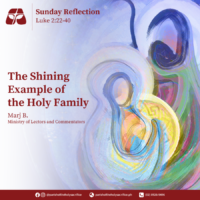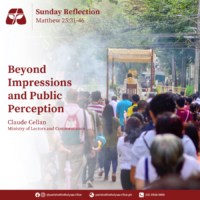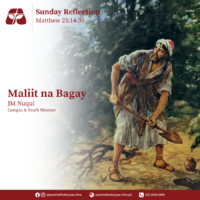The Joy of Forgiving
Rex Lago Paras
The Fourth Sunday of Lent is also known as Laetare Sunday. Laetare, which means “rejoice” is the first word of the entrance antiphon of the Mass for this particular Sunday. The entrance antiphon is from Isaiah 66:10-11: “Rejoice, Jerusalem, and all who love her. Be joyful, all who were in mourning; exult and be satisfied at her consoling breast.”
Laetare Sunday, the second to the last Sunday of Lent, disposes us to rejoice because our Lenten journey is almost over and the coming of Easter is near. Rose or pink maybe used as the liturgical color of Laetare Sunday, only the second instance throughout the liturgical year when such color may be used. The first is on Gaudete Sunday, the third Sunday of Advent, which has a similar theme of joy and rejoicing.
The Gospel for Laetare Sunday this year (Luke 15:1-3, 11-32) aptly ends with an invitation to celebrate and rejoice: “But now we must celebrate and rejoice, because your brother was dead and has come to life again; he was lost and has been found.”
The words, of course, are from one of the well-known stories of the Bible, the Parable of the Prodigal Son. We know the narrative. A man had two sons. The younger one demanded his share in his father’s estate, and after receiving it, “set off to a distant country where he squandered his inheritance on a life of dissipation.” “When he had freely spent everything,” he found himself struggling even for the barest of needs. He was “dying from hunger.” Realizing the error of his ways, he resolved to return to his father and beg for forgiveness. He was so resolute in throwing himself at the mercy of his father that when he came home, he told his father that “[he] no longer deserve[s] to be called [his] son.” The son added, “treat me as you would treat one of your hired workers.”
What happened next provides us with contrasting reactions to the younger son’s homecoming: (1) the heartwarming welcome from the father, and (2) the resentment from the older son.
“While [the younger son] was still a long way off, his father caught sight of him, and was filled with compassion. He ran to his son, embraced him and kissed him.” Then, the father ordered the servants to “bring the finest robe and put it on him.” The father also ordered them to “put a ring on his finger and sandals on his feet.” Lastly, he ordered that the fattened calf be slaughtered so that all may “celebrate with a feast” for the return of his younger son.
The father rejoiced! He celebrated the younger son’s return.
In stark contrast, the older son “became angry” and “refused to enter the house” when he learned that his brother has returned.
We have heard many times that the Parable of the Prodigal Son is a story of repentance and forgiveness. Whenever we talk about forgiveness, the focus is not only on the penitent who seeks forgiveness, but on the one who forgives, too. Forgiveness liberates both the repentant sinner and the source of forgiveness. It, therefore, brings joy to the forgiven and the forgiver.
Such was the joy felt by the father in the Parable of the Lost Son after he wholeheartedly forgave his son and welcomed him with open arms. His happiness could not be contained. The younger son’s return called for rejoicing and celebration “because this son of mine was dead, and has come to life again; he was lost, and has been found.”
The older son could not share in the celebration and rejoicing as his heart was filled, not with forgiveness, but with anger and resentment. He could not relate to his father’s excitement and could not understand the need for celebration. For the older son, his brother’s return was no reason to celebrate and rejoice. He thought and felt that way because he, unlike his father, had not yet forgiven. The older son provides us a picture of how anger and resentment can prevent us from receiving the gift of joy that comes with forgiving. Thus, when we juxtapose the image of the father with that of the older son, we are reminded that only in a heart that forgives can there be space to rejoice and celebrate the coming home of someone who has been lost and is found.
The two other parables found in Chapter 15 of the Gospel of Luke also show the same theme of celebration and rejoicing. Before sharing the Parable of the Lost Son, Jesus spoke of the Parable of the Lost Sheep in which he narrated the story of a man with a hundred sheep and, losing one of them, “leave[s] the ninety-nine in the desert and go[es] after the lost one until he finds it[.]” When the man finds the lost sheep, he heads home “with great joy,” calls together his friends and neighbors and invites them to rejoice with him. Jesus also spoke of the Parable of the Lost Coin in which he told the story of a woman with ten coins and, losing one of them, “light[s] a lamp and sweep[s] the house, searching carefully until she finds [the lost coin.]” Like the man who finds his lost sheep, the woman who finds her lost coin, “calls together her friends and neighbors and invites them to rejoice with her. At the end of these similarly-themed parables, Jesus declared, “in just the same way there will be more joy in heaven over one sinner who repents than over ninety-nine righteous people who have no need of repentance…there will be rejoicing among the angels of God over one sinner who repents.”
In Pope Francis’ 2019 Lenten Message, he underscores “the healing power of repentance and forgiveness.” This healing power culminates in the joy that permeates both the forgiver and the forgiven best exemplified by the joy of God who will never hesitate to forgive those who return to Him in repentance, and the joy of those who receive forgiveness from a merciful and compassionate God. Let us pray especially for the grace to forgive like the father in the Parable of the Lost Son did, so as to be healed and be filled with joy.


